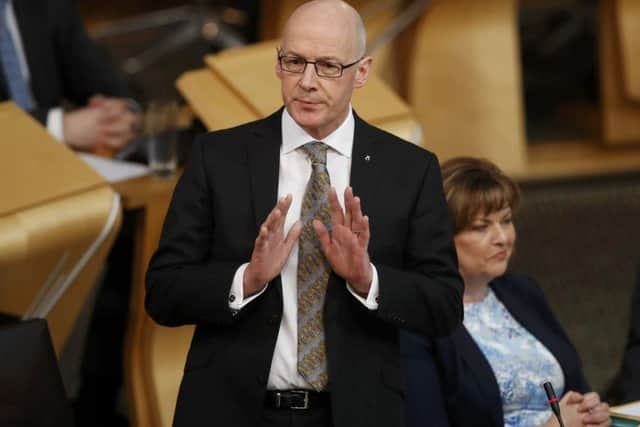John Swinney orders review of P1 tests amid claims he '˜defied Parliament'
But he came under fire from political opponents for “defying” the will of the Scottish Parliament, which recently voted for the assessments to be axed.
The review may find the tests should go, Mr Swinney insisted, after claims that some children have been left traumatised while teaching unions branded them a waste of time.
Advertisement
Hide AdAdvertisement
Hide AdIn a Holyrood statement he said he faced “competing considerations”, with most councils have previously carried out some form of assessments in Primary 1, before the national testing regime was introduced last year.


He told MSPs: “I have therefore decided to commission an independent review of the approach to P1 assessment within the context of the national improvement framework.
“The objective of the review will be to reconsider the evidence as the Parliamentary motion asked me to do.
“I’ve asked Her Majesty’s Chief Inspector of Education to provide me with advice on who should carry out this independent review.”
It means that the tests will continue during the 2018/19 school year.
The review will look at a number of issues surrounding the assessment, including the effect on children and how useful the findings of the tests have been. It will also look at whether the tests should continue or “whether they be substantially modified or whether they should be stopped”.
Mr Swinney added: “The outcome of the review could be a recommendation to stop the assessments. The review will be led by evidence and what is best for pupils.”
Advertisement
Hide AdAdvertisement
Hide AdMinisters have defended the tests, insisting they provide an important gauge of children’s development in the crucial early years and identify particular areas where they may need help.
Ministers have also insisted there should not be “set specific windows” for schools to undertake assessments.
Some councils have already looked into the prospect of scrapping the tests, since the vote in parliament and amid concerns among parents.
Larry Flanagan of the EIS teaching union said the reservations of the profession over the value of the tests had been spelled out to Mr Swinney.
He said the union was disappointed the tests were not being scrapped immediately, but added: “We accept, however, that in establishing an independent review, the Deputy First Minister is open to evidence about the efficacy of the SNSAs [Scottish National Standardised Assessments], although we would make the point that perhaps a review of the evidence before the introduction of the tests would have been more appropriate.”
The move prompted an angry reaction from opposition parties after they united to out-vote the minority SNP government at Holyrood last month and backed a motion calling for the tests to be axed.
Labour education spokesman Iain Gray said: “This whole statement was a justification for refusing to respect the motion and defying this Parliament. The cabinet secretary demands that we focus on education needs – that’s exactly what we did in reaching the conclusion that we did a month ago. Parliament listened to teachers, parents and the education arguments and voted accordingly.”
Conservative MSP Liz Smith hit back at Mr Swinney’s claims that opposition parties were guilty of political opportunism in their opposition to the testing regime. She questioned whether “Primary 1 teachers and those members of the public and parents opposing these tests are also a disgrace and guilty of political opportunism”.
Advertisement
Hide AdAdvertisement
Hide AdThe review was branded a “missed opportunity” by Greens education spokesman Ross Greer. He said: “They could have proven that they’re listening to teachers, parents, experts and parliament. They could have called a halt to these tests of four- and five-year-olds, but instead, the tests will continue.”
Liberal Democrat education spokesman Tavish Scott said: “58 days ago John Swinney published what he said was an evidence-based review and it was a whitewash. Now he wants another review.
“Teachers say national testing of five-year-old boys and girls add nothing to their knowledge of the child’s progress. So why are primary school teachers, parents and even the government’s educational advisers wrong and John Swinney is right?”
Mr Swinney has already shelved his Education Bill, which had at its heart his flagship plans to hand control over schools to headteachers.